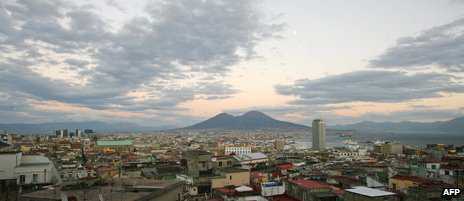By Alan Johnston BBC News, Italy

In today’s Magazine
- A Point of View: Mourning the loss of the written word
- Do the dead outnumber the living?
- Close encounters with Philippine witches
- America’s pink army revolts
With around one in three young Italians now unemployed, many of its younger generation are contemplating emigrating to destinations as far afield as Africa and South America, in the hope of better employment prospects.
One of Rome’s central squares is dominated by a vast monument to united Italy’s first king.
The Altare della Patria is sometimes nicknamed “The Wedding Cake”, with its stairways and towers rising up and up, all in gleaming white marble.
It is a rather overblown statement of national pride. But in its depths there is a place that tells the stories of those, who for one reason or another, had to leave Italy.
This is the Emigration Museum. It is full of fading old photographs of Italians carving out new lives for themselves in Buenos Aires, or Brooklyn, or Brisbane.
Emigration is very much part of Italy’s history but for this country’s younger generation, it is also part of the present. Many of the best and brightest young Italians talk about leaving.
Take, for example, Sebastiano. In my first days in Rome we sat on a flight of steps, chatting in the sunshine.
I remember asking him what journalists like me, newcomers, tended to get wrong about Italy and he said that we British were at a particular disadvantage.
He said we came from a land of quite clear-cut politics, where the winner takes all, where coalitions are rare, and where rules tend to be enforced.
He said I came from a black and white world, but that Italy was all shades of grey.
From Our Own Correspondent
- Broadcast on Saturdays at 11:30 GMT on BBC Radio 4, and weekdays on BBC World Service
- Listen to the BBC Radio 4 version
- Download the podcast
- Listen to the BBC World Service version
- Explore the archive
You could tell that Sebastiano knew and understood all those many shades and that he loved the place. But he saw no future here.
He reckons that in Istanbul – in rising, confident Turkey – there will be possibilities that he would never find in weary Italy – immersed in its worst economic crisis for a generation.
A few days later I met Samuelle. Clever, handsome, likeable and speaking several languages.
You would imagine him being able to walk into jobs all over Rome. But actually, he was unemployed.
Around one in every three young Italians is in the same position.
I heard the other day that Samuelle has now finally managed to find a job. But it is in Quito, in Ecuador.
And that was the thing a young guy called Vincenzo said. These days smart young Italians are not only heading for wealthier places, like Germany or Scandinavia – they are going all over the world.
To Latin America, Africa, anywhere, if it meant being able to get away.
Vincenzo works at a research centre at a university in Rome, where he said pretty much everyone wondered about going elsewhere, and he certainly will. He talked of a system here that is failing its youth.
A place where opportunities depend far too much on who you know and too little on what you know.
Like other young people I had met, he described a kind of national malaise, a lack of dynamism, openness and fairness and a strangling of potential.
Vincenzo has spent years engaged in left-wing political activism. He has worked to try to change things here.
But in the end, he said, “you’re forced to go away, and that’s what makes you sad”.
He said that Rome was, as he put it “just beautiful”, but that it was impossible for him and his girlfriend to stay if they wanted to make something of their careers.
Italy’s new government is acutely aware of the frustrations of the nation’s youth.
Prime Minister Mario Monti talks constantly of needing to create opportunities for the youngest Italians.
He says this is one of his major objectives as he sets about trying to restructure and re-energise the economy on a grand scale.
So down in Naples I asked a young journalist called Francesco if he believed that things just might change now and that Mr Monti might deliver for the new generation.
But Francesco was doubtful.
Even if the situation was to improve, he said, it would be years before you would really notice the difference.
Italy’s economic woes
- Italy’s credit rating was cut by two levels to A- last week
- The Bank of Italy forecasts the country’s economy will contract by up to 1.5% this year
- The Italian government recently approved a 5.5bn euro ($7.1bn/£4.57bn) package for investment in infrastructure, such as railway lines
And Francesco does not have time to waste. He felt that his life had stalled in Naples. The only work he could get would pay around 300 euros (£249; $393) a month. That is not even enough to pay the rent.
Francesco was planning to head for Berlin. We talked down on the sea front, just as the sun was sinking. A calm had settled on the huge bay and as we watched, just for a few minutes, Mount Vesuvius was bathed in an extraordinary, gentle, pinkish sort of light.
“Surely you’ll miss this when you leave?” I said.
Francesco replied that sometimes, living here, he was so lost in his troubles that it was hard to see the best in the place.
He said that when he was away it might be easier to really appreciate Italy and all the things that it offers, like that lovely vision of the Bay of Naples in the last of the light.





